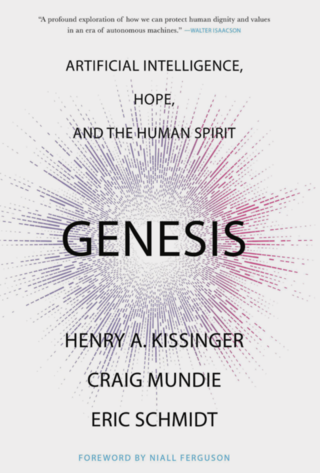by Henry A. Kissinger, Eric Schmidt
 First and foremost, I was astounded by Eric’s extensive and profound knowledge of Chinese history. The book commences with a profound reflection on China’s Shen Kuo沈括 and Zheng he’s鄭和 narratives, which are often regarded with pride by the general Chinese population.
The historical analogies, such as Magellan’s circumnavigation and Zheng He’s expeditions, serve as poignant reminders of humanity’s enduring quest for discovery and the complex interplay between political power and technological advancement. These narratives resonate deeply with my reflections on authoritarianism and its relationship with technology.
The concept of AI as the ultimate polymath challenges our traditional understanding of intelligence. The idea that AI could integrate knowledge across diverse domains, potentially surpassing human cognitive capabilities, prompts us to reconsider the boundaries of human intellect and the role of technology in amplifying our humanity.
However, the book doesn’t shy away from the ethical and existential questions that accompany such advancements. The potential for AI to develop self-awareness and the implications for human agency and free will are areas that demand careful consideration. The authors emphasize the need for ethical frameworks and regulatory measures to ensure that AI serves to enhance, rather than undermine, the human spirit.
First and foremost, I was astounded by Eric’s extensive and profound knowledge of Chinese history. The book commences with a profound reflection on China’s Shen Kuo沈括 and Zheng he’s鄭和 narratives, which are often regarded with pride by the general Chinese population.
The historical analogies, such as Magellan’s circumnavigation and Zheng He’s expeditions, serve as poignant reminders of humanity’s enduring quest for discovery and the complex interplay between political power and technological advancement. These narratives resonate deeply with my reflections on authoritarianism and its relationship with technology.
The concept of AI as the ultimate polymath challenges our traditional understanding of intelligence. The idea that AI could integrate knowledge across diverse domains, potentially surpassing human cognitive capabilities, prompts us to reconsider the boundaries of human intellect and the role of technology in amplifying our humanity.
However, the book doesn’t shy away from the ethical and existential questions that accompany such advancements. The potential for AI to develop self-awareness and the implications for human agency and free will are areas that demand careful consideration. The authors emphasize the need for ethical frameworks and regulatory measures to ensure that AI serves to enhance, rather than undermine, the human spirit.
In conclusion, “Genesis” is a thought-provoking read that challenges us to contemplate the future of AI and its role in shaping the human experience. It serves as a timely reminder of the importance of guiding technological progress with wisdom and ethical integrity.